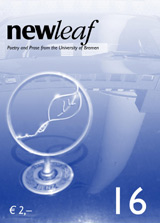editorial

can often bleed
over into the next issue, for intertextuality is never far from the surface in literature. In the newleaf you are now reading we have resonances from and echoes of the previous issue. The poem 'Ping' by Rita de Cássia Fischer, for instance, has a life of its own but takes on 'whole new dimensions' when read against and alongside the short story of the same name by Samuel Beckett which inspired it.
After Rita, we have a second Bremen Brazilian. Francisco da Rocha's translations into English and his native Portuguese of the first four poems from Wolf Wondratschek's cycle Orpheus in der Sonne (reissued to commemorate the author's sixtieth birthday in August 2003) are a particular brand of intertextuality, breathing new life by making the work available to other readers but also creating new poems in their own right.
Putting the magazine together, we sometimes intentionally look for, or once or twice unintentionally stumble over the internal intertextuality which can give each issue a flavour or stamp of its own. One of the joys of editing is finding that thread that weaves through the magazine, sometimes actually linking two consecutive pieces, sometimes allowing an echo two items further on. Another is seeing the almost finished product and then finding the as yet unseen links.
Number 16 goes from daybreak to apocalypse, travelling underground and in the sun, putting its finger on the places where dream and the harsh light of day painfully collide: a sometimes violent journey - a walk on hot streets - breathing in heat - driving on the highway - walking on fire.
Our centrefold this time is Franziska Kreuser's story which won our travel writing competition Been there? Do it! Get the Tee-Shirt, in which we asked students to capture in writing experiences they had had during that watershed that students of English - and, increasingly, students of Geology, Psychology, Economics, Physics or Marine Biology - call their 'Period Abroad'. Attached to the story is a short square homage to Franziska and her decision to go to England.
Four new authors in one issue is not a bad record, underlining the fact that we are constantly on the lookout for new voices to feature. Could you be next? Having said that, though, we know that hard-core newleaf readers will be pleased to see one or two regular names (Ole Herlyn, say), or some who have come to prominence recently (Franziska, or Tatjana Pfennig and Steffi Wiechers); while we are particularly proud to re-introduce some who were in earlier issues but have not been represented in the recent past: Tim Ingold, Katharina Kracht and Sophie Warning.
For the first time we have the same international guest twice running. Following on the three poems we published last time, we now offer a short story by Irish storyteller Noel King.
Not all Oliver Chrystossek's drawings are illustrations this time in the strictest sense, for the poems on pages 24, 25 and 31 grew out of workshop assignments based on the pictures. The texts illustrate the drawings.
Having been a double act for seven years, newleaf now has three editors. After a year or so of meticulous and imaginative copy editing and a summer of very intensive work, Julia Boll has now joined the board. Don't let anyone tell you three into sixteen doesn't go. And if you want to read about all those committed people who work just as intensively on sales, publicity and management, read the inside cover.
So here it comes: bittersweet sixteen.
Julia Boll, Simon Makhali and Ian Watson, November 2003
contents
-
Day Break
-
confession
enigma
Hot Streets (Arizona II)
-
Game Show
-
Ping
-
Sheep Kneeling
-
The Towering Inferno
-
Cronus
a frog in wonderland
-
deception
home
dreamcatcher
-
Period Abroad
-
Frenzy
-
Orpheus in der Sonne
Orpheus in the Sun
Orpheo ao Sol
-
Indra
Morning After
-
the dream
awake
breakfast
-
The Kitchen Poet
-
No Ghost in this Shell
close
guts
Restless
Swoop
Security Scan
Apocalypse
